As the second wave of the pandemic rages on, many dental clinics are either temporarily shut or not performing the entire range of treatments in an attempt to reduce aerosol risk. Being forced to remain at home is changing our whole lifestyle, which includes missing routine health check-ups. While good dental hygiene may not be on the long list of to-do things during the Covid-19 crisis, a toothache can quickly make things worse as one may not be able to visit the dentist due to quarantine or the clinic being shut.
So, here are some common tips to maintain good oral health at home.
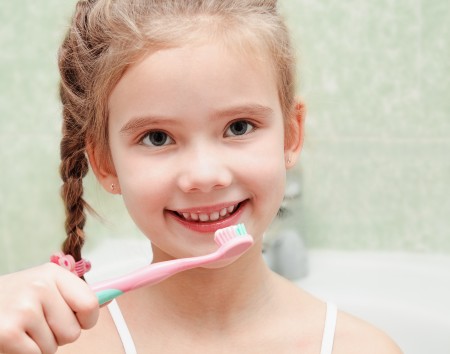
Shutterstock
Plaque control is possible with two to three minutes of proper brushing twice a day and flossing at least once a day.
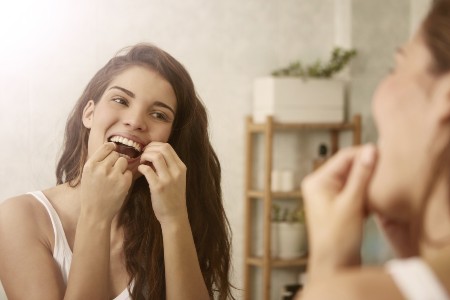
Shutterstock
Flossing can either be done with a threaded wax floss or new-generation water flossers, which are more effective but require a hand-held motorised device.
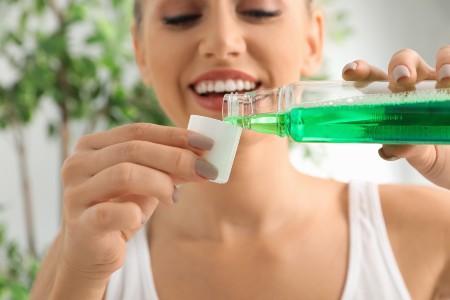
Rinsing the mouth well after every meal with warm salt water or mouthwash should be a must.
Eating a well-balanced healthy diet and drinking lots of water are strongly recommended.
Mouthwash should be used judiciously. Long-term use of mouthwash is not recommended as some mouthwash formulas can cause altered taste sensation and staining of teeth. Do not swallow your mouthwash.
Studies have shown that a 0.2 per cent concentration of mouthwash povidone-iodine (commonly called Betadine) has shown to reduce the risk of transmission of Covid as it reduces the viral load.
Reduced viral load as a result of healthy oral practices have also shown a decreased risk and severity of pneumonia in Covid-affected patients.
Diet Matters
Resist turning to unhealthy eating habits or snacking due to inherent quarantine-induced boredom or stress. Starchy foods or carbonated drinks lead to acid build-up in our mouths, which dissolves tooth surfaces. The more often our teeth are bathed in these acids, the weaker and softer they become. It is best to avoid non-fibre carbohydrates, which act just like straight sugar and contribute to plaque build-up. Avoiding processed foods and increasing intake of fresh fruits, veggies and fibrous foods would lead to overall better oral and general health.
Keeping yourself well hydrated and not overindulging in smoking and drinking is very important. Smoking inhibits the blood supply to your gums and increases your risk of gum infections. High exposure to alcohol can dry out the cells in your cheeks and gums. Chewing on ice, pen caps, or fingernails as a means of stress management can cause the teeth to chip or break. It is also recommended to avoid hard foods that can crack a tooth or damage fillings, things like popcorn, peanut brittle and sticky candy.
While it is always better to call up or teleconsult the dentist regarding a dental problem, there are a few home remedies that can be done to treat or control the problem temporarily.
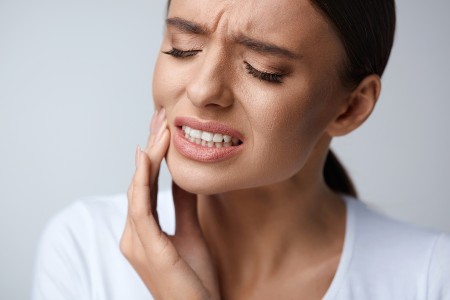
Shutterstock
Toothache
While it is important to figure out the cause of pain, a regular salt water rinse can help for minor irritations. Salt water is a natural disinfectant, and it can help loosen food particles and debris that may be stuck between the teeth. This can also help reduce inflammation and heal oral wounds.
For a toothache due to a cavity, the age-old remedy of clove oil is a very effective way of controlling the pain temporarily. A drop or two can be added to a small ball of cotton and placed in the cavity. If symptoms persist for more than a day or two, or if there is a swelling, then antibiotics and anti-inflammatory medication may have to be prescribed by a dentist. Avoid using too much clove oil as it can cause minor burns or temporary taste alteration. Go easy on the salt concentration in the oral rinse in known hypertensive patients.
Mouth sore/ ulcer/ irritation
Application of an oral ointment containing a local anaesthetic in the affected area 15 minutes before every meal is advised. A chlorhexidine containing oral ointment or a Betadine rinse is known to be effective in killing micro-organisms. In painful sores, application of a local anaesthetic gel (available as over-the-counter products) before meals is helpful. A sharp tooth causing soft tissue trauma to tongue, lips or cheeks is to be immediately attended to as there is a long-term risk of developing oral cancer in unchecked cases.
Dislodged cap (crown) or bridge
It is important to keep the crown or bridge safely aside in a container until the next dental appointment, instead of trying to fix it back on and resulting in a broken crown or broken tooth. Dislodged crowns also have the risk of getting swallowed or aspirated.
Clean your toothbrush
Viruses can attach to the plastic, soft bristles and other components of a toothbrush. Therefore, it’s best to clean toothbrushes on a regular basis. A good soak in mouthwash combined with a bit of hydrogen peroxide, followed by a thorough rinse under the faucet, can help maintain a clean toothbrush.
Accident or trauma to tooth or gums
First of all, it is important to not panic and remain calm. If there is bleeding, pressure should be applied in the area with clean cotton dipped in cold water preferably. An ice pack can also be applied. If there is persistent bleeding, a call to the dentist is a must.
Dental ‘emergencies’ where a visit to the dentist is required include:
1. Tooth pain with swelling (which does not subside after antibiotic treatment)
2. Trauma or fracture of tooth/jaws due to an accident
3. Consistent bleeding of gums
4. Swelling or pain around gums or neck
5. Tooth pain for people receiving radiation or other cancer treatment
6. Snipping or adjustment of wires of braces that hurt the cheek or gums
7. Post-surgical swelling with uncontrolled pain
8. Broken dentures, or sharp ill-fitting dentures.
In general, visit only clinics where dentists and their staff take proper Covid-19 precautions and personal protection gear. Therefore, it is absolutely imperative to always make a call or have an online consultation with the dentist before visiting the dental clinic to give the doctor time to make the necessary arrangements.
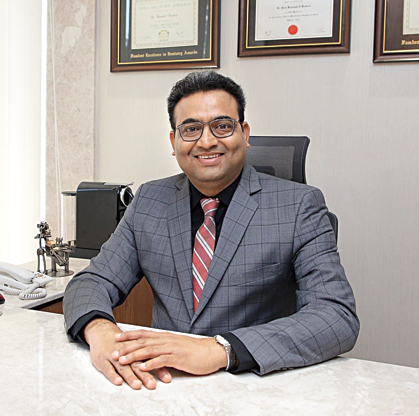
Dr Kamlesh Kothari is an oral and maxillofacial surgeon practising at Aesthetica in Calcutta. He is a former project director (Calcutta) for Smile Train (US), the world’s largest organisation working on treatment of cleft and craniofacial deformities










